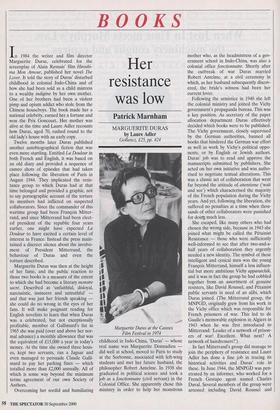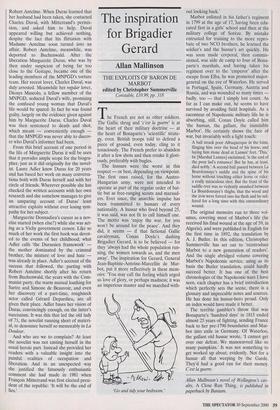BOOKS
Her resistance was low
Patrick Marnham
MARGUERITE DURAS by Laure Adler Gollancz, £25, pp. 424 In 1984 the writer and film director Marguerite Duras, celebrated for the screenplay of Alain Resnais' film Hiroshi- ma Mon Amour, published her novel The Lover. It told the story of Duras' disturbed childhood in colonial Indo-China and of how she had been sold as a child mistress to a wealthy indigene by her own mother. One of her brothers had been a violent pimp and opium addict who stole from the Chinese houseboys. The book made her a national celebrity, earned her a fortune and won the Prix Goncourt. Her mother was alive at the time and Laure Adler recounts how Duras, aged 70, rushed round to the old lady's house with an early copy.
Twelve months later Duras published another autobiographical fiction that was even more startling. Entitled La Douleur in both French and English, it was based on an old diary and provided a sequence of cameo shots of episodes that had taken place following the liberation of Paris in August 1944. They implicated the resis- tance group to which Duras had at that time belonged and provided a graphic, not to say pornographic account of the torture its members had inflicted on suspected collaborators. Since the commander of this wartime group had been Francois Mitter- rand, and since Mitterrand had been elect- ed president of the republic four years earlier, one might have expected La Douleur to have excited a certain level of interest in France. Instead the press main- tained a discreet silence about the involve- ment of President Mitterrand, the behaviour of Duras and even the ' torture described.
Marguerite Duras was then at the height of her fame, and the public reaction to those two books is a measure of the extent to which she had become a literary monstre sacre. Described as 'unfaithful, disloyal, narcissistic, insincere and untruthful' and that was just her friends speaking she could do no wrong in the eyes of her fans. It will make poignant reading for English novelists to learn that when Duras was a celebrated, but not exceptionally profitable, member of Gallimard's list in 1965 she was paid (over and above her nor- mal advance) a monthly allowance that was the equivalent of £15,000 a year in today's money. At the time she owned three hous- es, kept two servants, ran a Jaguar and even managed to persuade Claude Galli- mard to pay her parking fines — which totalled more than £2,000 annually. All of which is some way beyond the minimum terms agreement of our own Society of Authors.
Overcoming her sordid and humiliating Marguerite Duras at the Cannes Film Festival in 1974 childhood in Indo-China, 'Duras' — whose real name was Marguerite Donnadieu did well at school, moved to Paris to study at the Sorbonne, associated with left-wing students and met her future husband, the philosopher Robert Antelme. In 1938 she graduated in political science and took a job as a fonctionnaire (civil servant) in the Colonial Office. She apparently chose this ministry in order to help her monstrous mother who, as the headmistress of a gov- ernment school in Indo-China, was also a colonial office fonctionnaire. Shortly after the outbreak of war Duras married Robert Antelme, at a civil ceremony in which, as her husband subsequently discov- ered, the bride's witness had been her current lover.
Following the armistice in 1940 she left the colonial ministry and joined the Vichy government's propaganda bureau. This was a key position. As secretary of the paper allocation department Duras effectively decided which books were to be published. The Vichy government, closely supervised by the German authorities, banned all books that hindered the German war effort as well as work by Vichy's political oppo- nents, or by English or Jewish authors. Duras' job was to read and approve the manuscripts submitted by publishers. She acted on her own initiative and was autho- rised to negotiate textual alterations. This was a classic act of collaboration that went far beyond the attitude of attentisme Nall and see') which characterised the majority of the French population during the Vichy years. And yet, following the liberation, she suffered no penalties at a time when thou- sands of other collaborators were punished for doing much less.
She escaped, like many others who had chosen the wrong side, because in 1943 she joined what might be called the Petainist Resistance — those who were sufficiently well-informed to see that after two-and-a- half years of collaboration they urgently needed a new identity. The symbol of these intelligent and cynical men was the young Francois Mitterrand, himself a less influen- tial but more ambitious Vichy apparatchik, and it was in fact the group he had cobbled together from an assortment of genuine resisters, like David Roussel, and Petainist public servants in need of an alibi, which Duras joined. (The Mitterrand group, the MNPGD, originally grew from his work in the Vichy office which was responsible for French prisoners of war. This led to de Gaulle's memorable explosion in Algiers in 1943 when he was first introduced to Mitterrand: 'Leader of a network of prison- ers of war! Excellent. What next? A network of hairdressers?') In fact Mitterrand's group did manage to join the periphery of resistance and Laure Adler has done a fine job in tracing its historical activities and Duras' role in these. In June 1944, the MNPGD was pen- etrated by an informer, who worked for a French Gestapo agent named Charles Duval. Several members of the group were arrested including David Roussel and Robert Antelme. When Duras learned that her husband had been taken, she contacted Charles Duval, with Mitterrand's permis- sion, and asked him to help. Duval appeared willing but achieved nothing, despite the fact that his flirtation with Madame Antelme soon turned into an affair, Robert Antelme, meanwhile, was deported to Buchenwald. After the liberation Marguerite Duras, who was by then under suspicion of being far too close to the Gestapo, became one of the leading members of the MNPGD's torture team. Her recent lover, Charles Duval, was duly arrested. Meanwhile her regular lover, Dionys Mascolo, a fellow member of the MNPGD, seduced Duval's wife, promising the confused young woman that Duval's life would be spared. In fact he was found guilty, largely on the evidence given against him by Marguerite Duras. Charles Duval was then sentenced to death and shot, which meant — conveniently enough that the MNPGD was never able to discov- er who Duval's informer had been.
From this brief account of one period in the life of Marguerite Duras it will be seen that it provides ample scope for the biogra- pher, just as it did originally for the novel- ist. Laure Adler knew Duras for 20 years and has based her work on many conversa- tions both with Duras herself and with her circle of friends. Wherever possible she has checked the written accounts with her own research and she somehow manages to give an unsparing account of Duras' least attractive exploits without ever losing sym- pathy for her subject.
Marguerite Donnadieu's career as a nov- elist started (when else?) while she was act- ing as a Vichy government censor. Like so much of her work the first book was devot- ed to the events of her childhood; what Adler calls 'the Durassien framework' the mother dominated by the criminal brother, the mixture of love and hate was already in place. Adler's account of the success that followed, the parting with Robert Antelme shortly after his return from Buchenwald, the years with the Com- munist party, the warm mutual loathing for Sartre and Simone de Beauvoir, and even her discovery of a part-time, roughneck actor called Gerard Depardieu, are all given their place. Adler bases her vision of Duras, convincingly enough, on the latter's narcissism. It was this that led the old lady of 71, the novelist running short of materi- al, to denounce herself so memorably in La Douleur.
And who are we to complain? At least the novelist was not casting herself in the usual heroic part. Instead she provided her readers with a valuable insight into the painful realities of occupation and liberation. And in an unexpected way she justified the fatuously enthusiastic comment she had made in 1981 when Francois Mitterrand was first elected presi- dent of the republic: 'It will be the end of lies.'



























































































 Previous page
Previous page